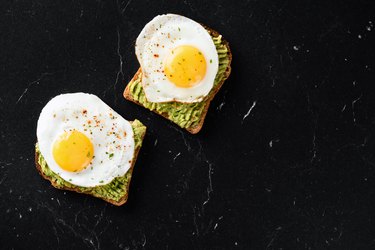
It seems pretty simple: Cholesterol is bad. It's a little more complicated than that, though. Cholesterol — a fat-like substance found in all of your cells — is essential to your health in small amounts, according to the Centers for Disease Control and Prevention (CDC).
The good news? Your body makes all the cholesterol needed for physiological functions like vitamin D and hormone production, so getting cholesterol from your diet is unnecessary, according to the National Heart, Lung and Blood Institute.
Video of the Day
But given how easy it can be to grab high-cholesterol meals on the go, many of us get too much. That's where the trouble comes in. High levels of cholesterol in your blood can build up and narrow — or even block — your arteries, which can increase your risk for a heart attack or stroke.
Dietary cholesterol and plasma cholesterol (what your body produces) are very different, says Alice H. Lichtenstein, a doctor of science and volunteer expert for the American Heart Association and Gershoff Professor of Nutrition Science and Policy at Tufts University Friedman School.
"Dietary cholesterol comes in one form, is released during digestion and then absorbed or excreted," she says. "Cholesterol in plasma circulates on lipoprotein particles, two of which are low-density lipoproteins (LDL) and high-density lipoproteins (HDL). Higher LDL levels are associated with increased cardiovascular disease risk, while upper HDL levels with decreased cardiovascular disease risk."
Minimize High Cholesterol Foods
The U.S. Office of Disease Prevention and Health Promotion's 2015 Dietary Guidelines for Americans do not specify a specific limit on daily dietary cholesterol. (The previous guidelines included a limit of 300 milligrams per day.) That doesn't mean, though, that you don't need to think about your cholesterol intake. Far from it: The latest guidelines simply advise getting as little as possible.
Cholesterol is found exclusively in animal foods. The primary sources in the American diet are eggs, meat (especially beef and chicken) and dairy products.
Because saturated fat and cholesterol in food almost always go hand-in-hand (notable exceptions are shrimp and egg yolks), following the recommended food patterns put forth by the USDA will inherently limit cholesterol.
Enjoy Cholesterol-Fighting Foods
Can you eat your way to lower cholesterol? To an extent, yes. Adding foods to the menu that lower LDL — that cholesterol-carrying particle that paves the way for artery-clogging atherosclerosis — is a means of achieving a low cholesterol diet, according Harvard Health Publishing.
Soluble fiber from high-fiber foods, such as oatmeal, eggplant, okra, kidney beans, apples and pears, binds cholesterol in your digestive system, inhibiting its entrance into your bloodstream.
Fish provides omega-3 fatty acids, which lower LDL levels and help protect your heart. Nuts also contain contain heart-healthy fats. Eating two ounces of nuts, such as walnuts or almonds, every day can slightly lower LDL.
"If you replace foods that increase LDL cholesterol — for example, cheese, which is high in saturated fat — with foods that don't, like nuts — which are high in unsaturated fat — you are 'fighting' high LDL cholesterol," says Lichtenstein, adding that gradually adding a variety of cholesterol-fighting foods into your diet is an easier (and ultimately, more successful) approach for many people than just focusing on one or two.
Know Your Cholesterol Levels
Everyone should have a solid idea of what their cholesterol levels are, so it's a good idea to see your physician regularly for a test. Testing will reveal your levels of LDL, HDL and total cholesterol. Armed with that knowledge, you can work with your doctor to get your cholesterol levels to the optimum levels for you.
- Harvard Medical School: "Harvard Heart Letter: 11 Foods that Lower Cholesterol"
- U.S Office of Disease Prevention and Health Promotion: "Dietary Guidelines 2015-2020"
- National Institute on Aging: "USDA Food Patterns"
- Tufts University: "Alice H. Lichtenstein"
- National Heart, Lung and Blood Institute: "High Blood Cholesterol"
Is this an emergency? If you are experiencing serious medical symptoms, please see the National Library of Medicine’s list of signs you need emergency medical attention or call 911.